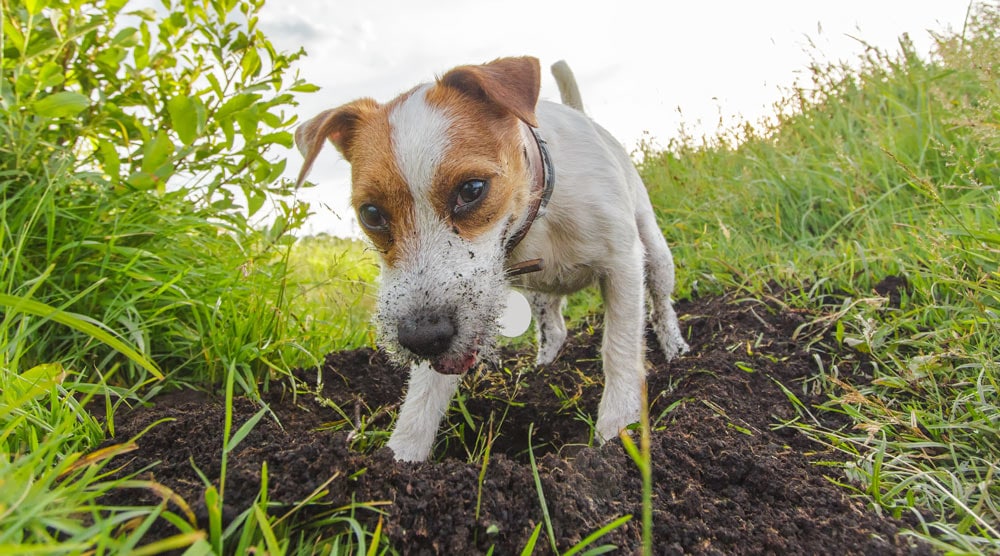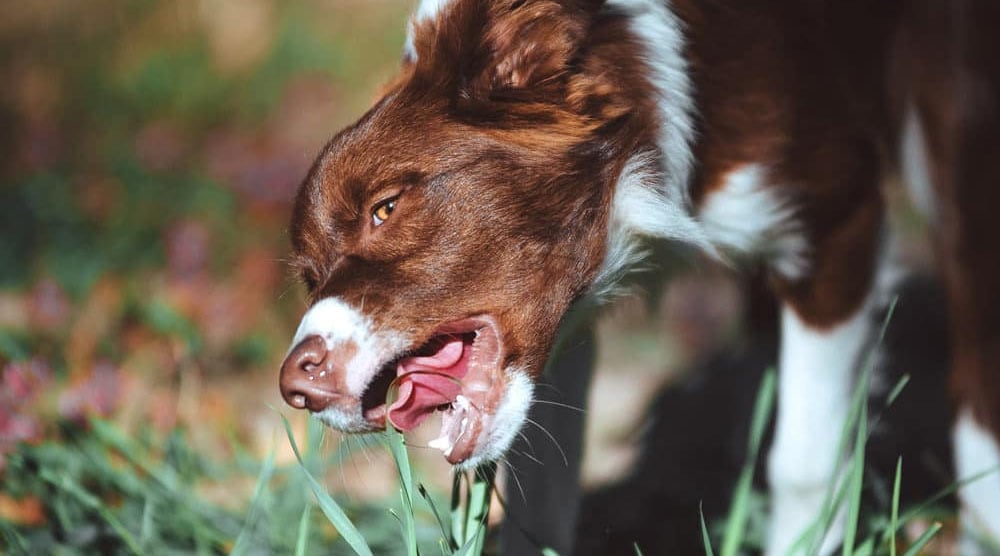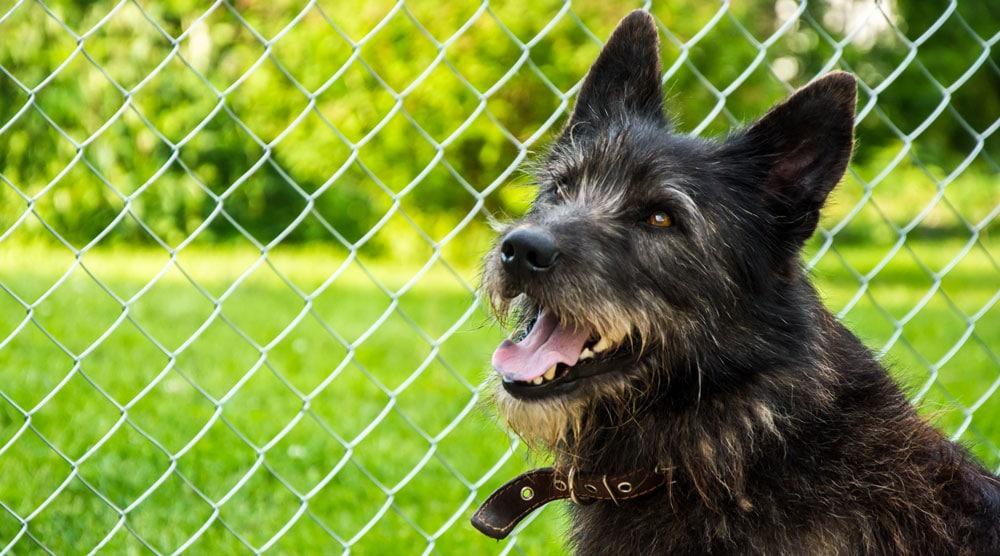Key Takeaways
- Digging is a natural canine behavior that should never be punished.
- As a natural behavior, it’s hard to completely stop a dog digging. However, there are ways to manage and reduce this behavior using positive techniques.
- Start by ensuring the dog’s needs are met, including providing enough physical exercise, mental stimulation, and minimizing anxiety triggers. Consider making digging spots less accessible.
- Supervise your dog in the yard and interrupt digging by calling their name and giving in a treat when they come to you. You will need a strong recall for this to work.
- Create an acceptable digging area and only reinforce digging in this place.
It can be frustrating when your dog’s digging ruins your lawn! But before you can stop digging, it’s important to realize that digging isn’t a “naughty” behavior.
The urge to dig is a natural instinct for canines, especially in certain breeds. Prolific digging can also signify boredom, stress, a desire to roam, or other factors.
In this article, we’ll discuss some positive training techniques for how to stop dogs from digging. We’ll also go through the most common reasons for digging, along with training tips from IMDT-accredited dog trainer Rebecca Morello.
Contents
How to Stop Your Dog From Digging
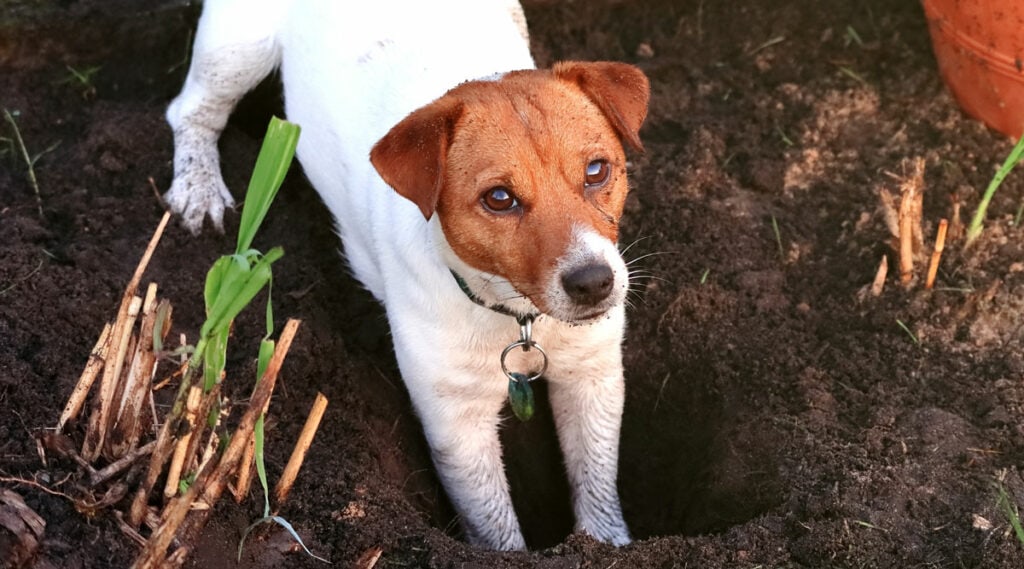
It’s difficult to prevent a dog from performing natural behaviors, so management is the key when handling dog digging. Here’s a four-step process for reducing this behavior.
Step 1: Never Punish or Scold Your Dog for Digging
Never scold or punish your dog for digging, even if you feel frustrated by the new hole in your garden. Digging isn’t a “naughty” behavior – it’s something dogs do naturally.
Punishment or scolding only teaches dogs that humans can be unpredictable and scary. It doesn’t teach the dog that digging is “wrong.”
Even if the dog stops digging in that moment, this is because they are worried by raised voices and trying to diffuse the situation. They will not link the person’s anger to the act of digging, because they don’t have the ability to understand a human’s sense of etiquette. Ultimately, punishment can also cause lasting damage to the human-dog bond.
In some cases, scolding could even cause your dog to dig more. Punishment increases anxiety, leading to further digging, destructive behavior, or even aggression as a coping strategy.
Step 2: Ensure His Basic Needs Are Being Met
Dogs will often dig if they’re bored, stressed, or uncomfortable. By addressing issues in their lifestyle, you may be able to reduce or even eliminate your dog’s compulsion to dig.
Some examples to consider include:
- Are they getting enough physical exercise?
- Do they need more mental stimulation or playtime? Are you offering them toys, puzzle feeders, games, training, and other enrichment around the home?
- Are they being left outside unsupervised for long periods?
- Are they showing signs of separation anxiety, stress or fearful behavior?
- Is your dog being left outside when the weather is too hot or cold?
- Do you have an unneutered male that wants to roam?
- Do you have a female in season who is trying to find a mate?
Step 3: Avoid Leaving Your Dog in The Garden Unsupervised
It may seem obvious, but the best way to prevent digging is to combine management strategies with supervision in the garden.
“Prevention is always better than cure,” says Rebecca Morello, IMDT dog trainer. “Blocking off areas your dog is likely to dig is a great first step. This avoids the habit becoming ingrained further, and minimizes conflict and stress between you and your dog.”
For example, consider placing temporary fencing around digging hotspots as a passive way to break the habit.
Then, when your dog is in the garden, always make sure you keep a close watch on their behavior. Supervision allows you to interrupt digging and start teaching alternative behaviors, which is a key step.
If you see your dog lining up to dig, distract them by calling their name and rewarding them with a tasty treat and fun toy. Over time, this will teach your dog that alternative behaviors are more pleasurable than the act of digging.
Of course, you’ll need a strong recall command before trying this. If your dog doesn’t reliably come when called, practice this first until he always responds.
Important: Avoid techniques that cause the dog discomfort when digging (such as prickle strips) and startling dogs if they start digging (such as spray cans, rattling a glass jar and shouting).
Step 4: Create an Acceptable Digging Area
For dogs with strong digging instincts, stopping the behavior is virtually impossible. Instead, you should give them a designated place to channel this desire that won’t cause your garden to be ruined.
“The best way to introduce an allowed digging area is by restricting access to the rest of the yard,” says Morello. “This ensures there’s no chance of the dog digging elsewhere and accidentally reinforcing unwanted habits. Alternatively, you can always take them out on a leash while they are learning where it’s acceptable to dig.”
An easy way to make this area is with a small patch of loose topsoil. Bury fun items in the digging area, such as toys and treats, so that digging in the “right” place is more fun than anywhere else.
Whenever your dog digs in this area, give plenty of praise to reinforce the behavior. If they focus on another space, call them back over to the designated spot and offer a reward when they dig there.
This method takes consistency. But over time, your dog will learn that digging in the designated area is more rewarding than the rest of the garden.
Tip: Ensure the designated digging area doesn’t contain poisonous bulbs, plants, or other potential hazards. Sandpits are also a great option for a digging zone, but keep them covered and monitor the sand regularly for mold.
Other Tips for Reducing Digging
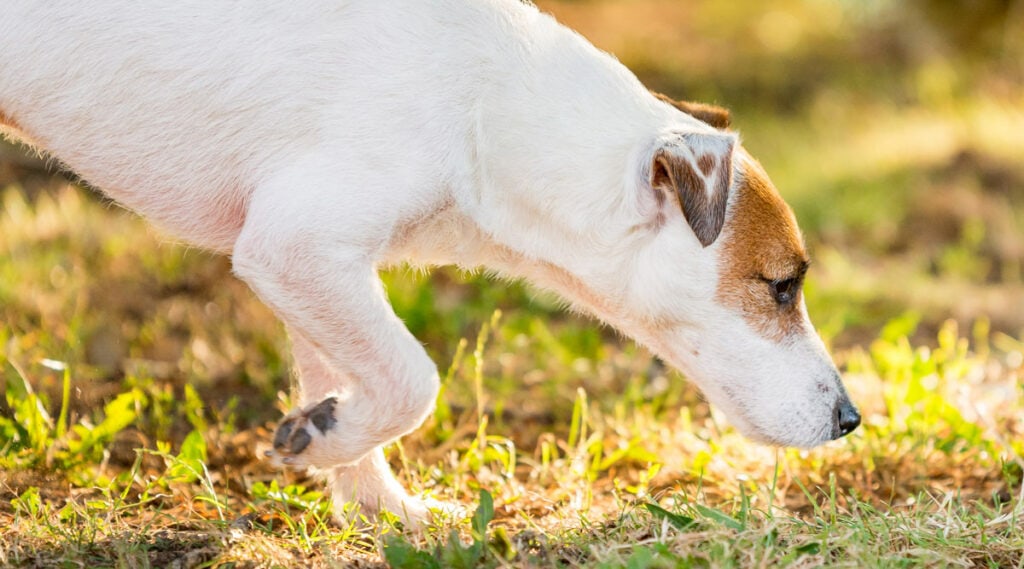
There are several other management strategies that could help you deal with your dog’s digging habit. These include:
- Humanely remove pests and vermin from the garden if your dog is obsessed with hunting for them. Make sure you avoid chemical solutions that could be dangerous for your dog.
- Offer your dog plenty of shade in warm weather and keep your dog indoors when the weather turns cold.
- If you have a terrier breed with a strong instinctual drive to dig, you could offer another outlet for this drive through the competitive sport referred to as Earthdog. This encourages the dog to follow a scent trail through a man-made tunnel to find their quarry (no animals are harmed).
- If your dog is digging as a result of stress or separation anxiety, it could be helpful to consult a qualified dog behaviorist. They’ll provide clear guidance and a behavior modification plan.
- Some people recommend digging deterrents, such as red cayenne pepper, vinegar, or citronella. The idea is that the unpleasant smell makes it less likely for a dog to dig areas where they have been applied. However, we don’t recommend using negative deterrents such as cayenne pepper, as they can cause irritation to your dog’s nose and are only a short-term solution (if they work at all.) Fences or blockages that stop your dog from getting to the digging site are a much better option.
Why Do Dogs Dig Holes?
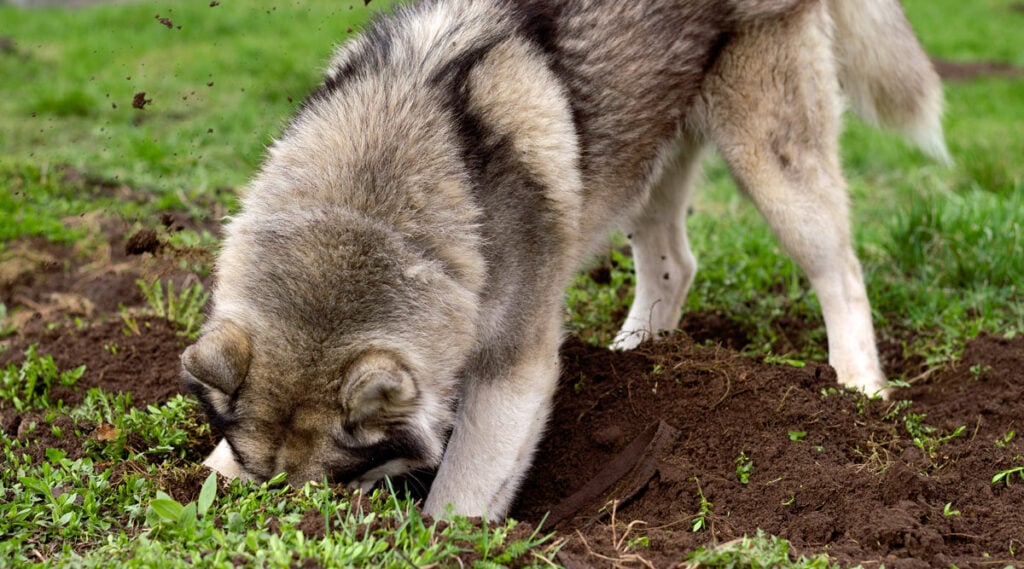
Digging, just like tail wagging, sniffing, and barking, is a natural behavior for dogs. Trying to extinguish this drive, aside from being a near-impossible challenge, could be damaging to your dog’s mental well-being.
Rather than expecting your dog to stop digging altogether, managing it is a more sensible strategy. But before you can reduce your dog’s digging, you need to understand why they’re doing it in the first place.
Boredom, Stress, or Frustration
If your dog is bored, understimulated, or stressed, they may resort to digging as a way to stay entertained or to relieve emotional tension. This will often be combined with other signs of stress, such as excessive barking, reactivity, hyperactivity, restlessness, and lip licking.
Common causes of boredom include being left alone for too long, insufficient physical and mental exercise, and a lack of toys to play with. Digging caused by boredom can develop into an obsessive behavior if not addressed.
“Enrichment can help reduce challenging behaviors such as digging, because it mentally tires your dog and releases calming hormones,” says Rebecca Morello, IMDT dog trainer. “The activity doesn’t need to be similar to digging, but can be anything that encourages your dog to chew, lick or sniff.”
However, just letting your dog into the yard isn’t enough to provide enrichment. “Many of my client’s dogs who dig also have free access to the yard or garden,” says Morello. “This isn’t necessarily a bad thing, but garden time isn’t a substitute for exercise and social interactions with us humans!”
On the other hand, overstimulation and overtiredness can also cause digging. “I’m often contacted by clients with a young puppy who keeps digging, and this is often caused by overstimulation,” says Morello. “These puppies start digging instinctively, but it can become an ingrained habit over time. Puppies need around 18 hours of sleep per day, so make sure you are giving your dog plenty of opportunity to rest in a quiet area of the house.”
Creating a Den
You might have noticed your dog frantically scratching at their bed before lying down. This is thought to be an instinctive behavior, often referred to as ‘denning’.
Wolves dig dens to create a safe, secure, comfortable and scent-marked space, mainly when they’re rearing pups. Your dog could be mimicking this behavior by creating a little sleeping pit in the garden.
If you have a pregnant bitch, they may also have a desire to create a den in the garden.
Hunting Small Animals
If you have a dog with a strong prey drive, they could be digging holes to hunt for small animals. A dog’s brilliant sense of smell makes it possible for them to notice a scent beneath the lawn surface.
Certain breeds are more likely to dig for prey. These include terriers, which were bred for this purpose. “Most terriers were originally bred to hunt wildlife underground, so it’s not surprising that they still act upon this behavior,” says Morello.
Escape Attempt
If your dog is an escape artist, has a desire to roam, or there’s something tempting behind the fence, they may dig in an attempt to get to the other side. Left unattended, the best diggers can escape much quicker than many dog owners realize.
Burrowing to escape can also be a symptom of separation anxiety or stress.
Hiding Food or “Valuable” Items
You’ll no doubt have seen cartoon dogs digging holes to store bones – but “real” dogs hide high-value items too. This instinctual behavior arises when a dog wants to keep a prized possession, like a toy or a tasty chew, safe to come back to later.
“French bulldogs are a breed that I find often bury their toys and prized chews,” says Morello. “This often comes as a surprise, as we expect them to be an inactive breed and share the traits of a bulldog. However, the Frenchie was originally mixed with Parisian ratter dogs to get their smaller size!”
Unfortunately, it’s common for dogs to forget the exact location of the item. This can lead to them digging more holes in an attempt to find it again!
Temperature Regulation
If your dog is outside in extreme temperatures, they may dig a hole to keep cool or warm.
Again, this is an instinctual behavior due to the insulating properties of the ground. While digging may help regulate their temperature, dogs should never be left outside in conditions that might trigger this behavior.
Even if the weather isn’t too extreme, dogs that were bred in cool climates may dig in certain conditions. For example, Siberian Huskies and Malamutes are notorious diggers.
It’s Fun!
Some dogs dig simply because they enjoy it. It’s a self-rewarding behavior for many canines, which is why it’s difficult to completely stop.

Are Some Breeds More Likely to Dig?
Dogs with a strong hunting drive are more likely to dig. Terrier breeds, for example, were bred to follow their quarry into underground dens and dig them out. Breeds like the Jack Russell, or those in the Hound group, like Beagles or Dachshunds, can all be prolific diggers.
The arctic breeds, like Huskies, also tend to dig more – but for a different reason. As they were bred to live in cold climates, they have a natural instinct for creating a temperature-regulating den.
Do Dogs Grow Out of Digging?
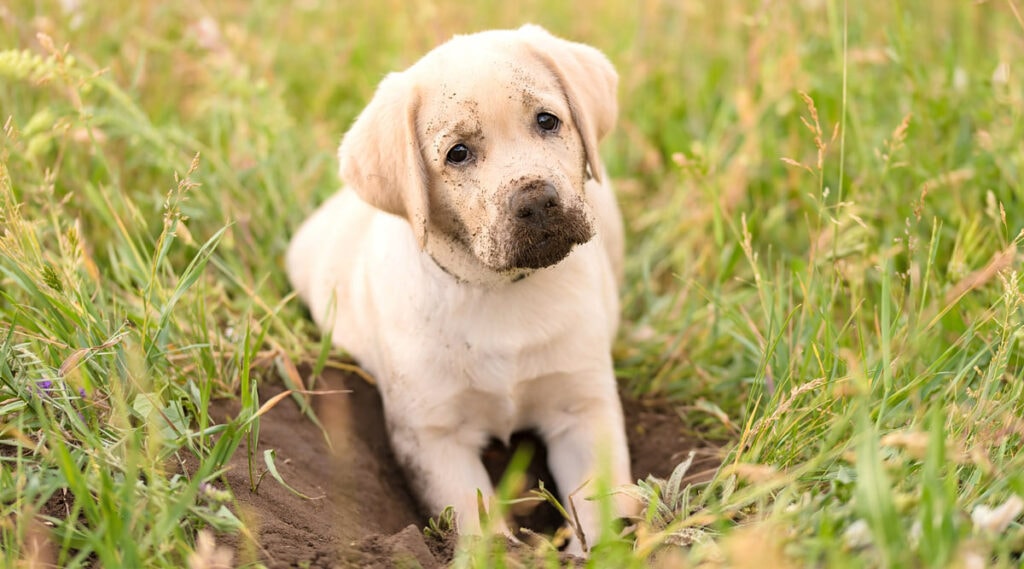
If your puppy or adolescent dog is digging, then there is a chance this behavior will reduce as they get older. However, in most cases, the digging won’t naturally stop as a dog gets older. This is why a management and positive training strategy is important.
Some dogs are less likely to grow out of digging than others. Breeds that instinctively want to dig, including terrier breeds, are much less likely to stop digging as they get older.
Summary
Digging is a behavior that comes naturally to many dogs, particularly breeds such as terriers and Siberian Huskies. While it can be frustrating when your dog digs your lawn, digging is an instinctive behavior that should never be punished.
Start by setting your dog up for success by never leaving them unsupervised in the garden, working on rewarding alternative behaviors, and assessing whether they’re getting enough exercise and enrichment. If the desire to dig is strong, training your dog to dig in a designated spot (such as a sand pit) can also be helpful.
Do you have any questions about how to stop dogs from digging? Please use the comments form below. You may also want to read our article about why dogs dig and scratch at carpets.
